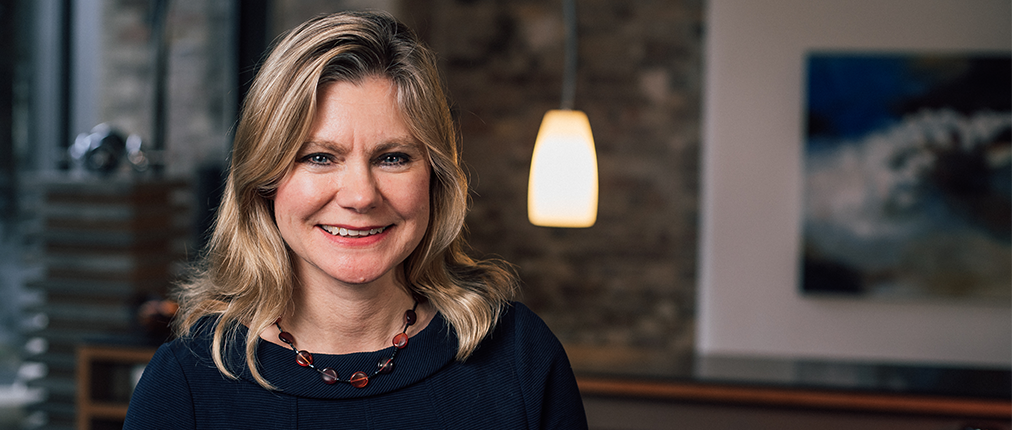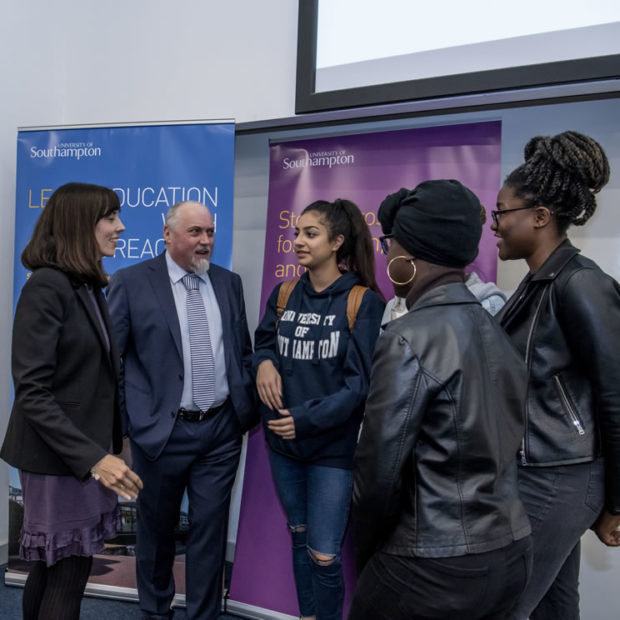Hartley News Online Your alumni and supporter magazine
The University has been working with alumna Justine Greening to develop our widening participation strategy and ensure we can offer a world-class education to students from disadvantaged and under-represented backgrounds and help prepare them for a bright future.
Rt Hon Justine Greening has worked as an economist, accountant, politician and is the founder of the Social Mobility Pledge, a coalition of 550 businesses and 50 universities representing almost two million students. It encourages organisations to be a force for good by putting social mobility at the heart of their purpose.
Justine has also been a passionate advocate of the University’s Ignite Programme, an extensive three-year funded programme available to students from underrepresented backgrounds that offers a blend of financial, academic, career, and personal opportunities. The programme is entirely funded by donations from our alumni and supporter community.
We spoke to Justine about her work with the University, the inspiration for her work in broadening access to education and her memories of Southampton… and, of course, Jesters.
Justine, you’ve been instrumental in developing 14 levelling up goals for institutions and businesses to use as a yardstick for improving social mobility. What is it about the current moment that makes the goals so timely and important?
The goals give us the challenges we’ve got to meet if we’re going to deliver equality of opportunity and this has never mattered more. Throughout the COVID pandemic, we’ve seen that it’s the people furthest away from opportunity who have been affected the most, particularly in terms of access to education.
Home education has suddenly become a massive issue, highlighting a lot of inequality: simple issues that many would take for granted, like having a laptop to work on, reliable broadband or the physical space to work at home.
The pandemic is one of several factors that have widened the gap and made the call to address these inequalities even more urgent.
What sparked your passion for trying to increase social mobility?
Social mobility has characterised my own life and for me, arriving at the University of Southampton in the late 1980s, I didn’t know anyone else who had been to university and was the first in my family to attend. When my parents dropped me off, I really had no idea of what it was going to be like.
I’m absolutely delighted to be working with the University on levelling up now because Southampton was one of those places that was a real turning point in my own life. It took me – someone who had grown up in Rotherham and never really travelled – and completely opened my eyes to a world of opportunity.
But crucially, university also helped me to understand how to go after some of those opportunities. As I progressed further in my career, going into politics and everything that has come afterwards, I’ve always been keen to ensure I’m putting my time into making the journey easier for others, and removing the barriers wherever I can.
I think social mobility is an issue that is now much more widely understood as a challenge for the whole country, one that we all need to play a role in fixing.
It’s one thing having some inspiration and another thing working out what you’re going to do about it!
My favourite job in government was Secretary of State for Education. I always said it was the best job I’ll ever have, and I think that’s probably true, but I also wanted to really work with employers to inspire them to think about the wider talent pool that was out there and being overlooked.
The link back to universities like Southampton is crucial because of course they’re the pipelines that help people from much more diverse or lower socioeconomic backgrounds, like my own, and under-represented demographics, to get ready to take advantage of the opportunities that employers have to offer.
But it’s two-fold: you also need employers to be ready to take that talent and that’s why programmes like Ignite at Southampton are so important.
So, my social mobility work has been inspired by my own journey, but it’s also come out of my experiences in politics, education and industry. I kept seeing that lots of businesses were passionate about playing a role in improving things, and they needed a project that they could get involved in to help them do that more easily. So that’s what I’ve created.
You mention the Ignite Programme and many of our alumni and supporters will be aware of the fact that it’s a flagship social mobility initiative for the University – many of them have donated to fund the bursaries that underpin it. Do you feel the programme ties in well with your own work in this area?
I think it’s a fantastic programme.
The programme didn’t exist when I was at the University and although I loved my time at Southampton, I’m sure Ignite would have helped me settle in faster. From the word go, it would have prompted me to think about my next steps after graduation. Like many students, I didn’t have any idea of what I wanted to do: even going into my final year, I wasn’t really sure. I wasn’t that confident in myself.
When I look at the key elements I feel are important for students, I think the Ignite Programme ticks all the boxes. Of course, meeting prospective employers is important, but equally it’s important to understand what’s out there in the first place. To pursue an opportunity, you need to know about it, and then you need the confidence to think ‘I can do that’.
For example, I never thought about doing law because I’d never met a lawyer. Even when I was studying economics and I loved it, I never thought seriously about going into banking. I might have enjoyed making sure companies that were growing got the funds they needed to create more jobs, but I didn’t think it was for me.
This is one piece of the puzzle that the Ignite Programme absolutely addresses. The second piece is developing the right knowledge and skills, which is what the mentoring element of the programme can help with, along with building the connections you need to succeed.
There’s a final piece which is about resources: you might want to do something, you might be completely capable of it, but if you haven’t got the resources behind you, sometimes it’s just financially not possible.
So the fact that there are also bursaries as part of the Ignite Programme means that it really is addressing everything that a student will need to get in place if they’re going to have the best chance of making the most of the experience and education that they are getting at Southampton.
You’ve said that your time at Southampton was key in opening up the future for you. Could you tell us a bit about the specific things that set you on your path – you say you didn’t expect to go into politics, for example?
It was genuinely transformative. There’s no other word for it. I think sometimes people say an experience is transformative when it isn’t really, but my time at the University genuinely was utterly transformative.
I loved meeting very different peers at Southampton. It was the first time I got to meet people who’d been privately educated. I’d heard these people existed but I’d never actually come across anyone from that world.
Southampton was the university I wanted to go to because it was doing a version of economics that was much more applied; now you would probably call it behavioural economics, but back then it was basically looking at risk perception. It was in the early days of that research, which was only just being published and Southampton was a university that was really innovating, so I absolutely loved it.
In the end I did get into politics, a lot later, but Southampton proved to be where I’d start my career. After I graduated, I spent a year doing research into risk and risk perception at the Centre for Risk Research. It was just me and Professor Johnny Johnson, who still does work with the University. Then later I went into business, became an accountant, worked in industry and then politics.
I absolutely loved the area. For me, Southampton was the perfect place to go to because I’d grown up near Sheffield. The city had the same feel and size to it. It felt manageable to somebody like me that hadn’t gone that far before. People were very friendly. I always remember that I just felt like it was home very quickly.
I had lots of great nights out in Saint Mary’s and at Jesters, which I can’t believe is still there today! I drove past it when I visited the University recently. I thought “I’ve got to find out if it’s still there” and of course, there it was.
I rented with other students in the famous Derby Road in Saint Mary’s. I don’t think I missed out on anything! The full Southampton student experience!
The University has been thinking a lot about the civic agenda: about how universities can be involved in their local communities and the wider community. What are your thoughts on what the role of a university is, or perhaps should be, in relation to its civic responsibilities?
I think a university like Southampton can play a massive role. It has the ability to lead across the city and in the region because it’s an organisation with a big footprint and a high level of expertise. It’s a major employer in the city and beyond, and it’s got a longevity to it.
In politics, people and governments come and go: councils come and go, but the University can be an anchor institution. I think it’s fantastic to see a university like Southampton working alongside its local partner institution, Solent University. I think individually and collectively the two universities can, and do, play a really valuable role in local communities.
I wondered if you could speak a little bit about the process of working with the University and the plans that have been put in place? In terms of the strengths you think there are, but potentially also where we might want to go in future to build on those as well.
Well first of all, it’s been fantastic working with the University. We’ve had brilliant engagement from higher education on our social mobility work and I think for a lot of universities this is really at the core of how they see their impact.
For me to be able to work with the University, the one university that had that impact for me on a personal level, has been fantastic. I’ve very much valued working with Vice Chancellor, Professor Mark E. Smith, and his leadership team on this. The Ignite programme is really ground-breaking and trailblazing. I think the opportunities are to look at how that can scale up and develop in the future. I think we need to see how we can help other universities learn from the very well-structured approach that the Ignite programme takes.
I think there’s an opportunity to monitor results and then take an evidence-driven approach to look at how the programme can be continually improved. I think there’s a continued opportunity for the University to challenge itself to do more in the wider community. I think it’s incredibly well placed to help raise aspirations, but also help raise attainment.
Finally, I think the University can show it’s an engine of social mobility as an employer – in terms of the people it employs, in terms of how it procures and in making sure that all the opportunities to change lives for the better are taken. I think the engagement from Southampton has been brilliant and I’m looking forward to the journey ahead, once we’ve got the levelling up white paper and plan published.
Being able to put something back into a university that really gave me so much is a fantastic opportunity. I’d love to play my role in helping Southampton be successful for a brand new generation of people.
What’s next on the agenda for you? Presumably you’ll be continuing your work in in this area; anything else on the horizon?
I’m absolutely going to focus on improving social mobility and continue to work with fantastic organisations, like Southampton, that can push it forward. I really feel that we’ve already got some amazing universities involved in this, some really big businesses, but also smaller ones, and we’re starting to do a lot more work with civil society and charities. So what I’m looking forward to doing as we recover from the latest Omicron variant, is starting to bring all of those amazing leaders together so that they are able to get on and create that impact.
I think in 2022 we will have a big push on metrics and measurements and improving reporting. What gets measured gets done and now we’ve got the levelling up goals to benchmark against. The goals are focused on access to education and opportunity, and so now, when we need to keep track of what might get in the way or help us move forward, we’ve got the metrics for how we measure that.
We’ve built this incredible coalition who can start to dig into this in a more systematic way, drawing on all that expertise that universities have on evidence and knowledge exchange. We can really start to analyse what works and start sharing that. That’s how you can get levelling up happening quickly.
I’m keen to build relationships at scale, so that organisations and institutions can naturally find one another through the levelling up interest they have in common. Then they can drive forward their own ideas and it doesn’t have to be top down. Eventually we can get to a place where we have grassroots action, loads of innovation and we can harvest all those ideas and spread them around the system and it can be self-sustaining.
A lot of the answers on how we change things for the better are already out there. Communities, employers, people are out there doing stuff that does work. The faster we can find that good work and spread it, the bigger the impact will be. That’s where all my focus goes – that and really encouraging everyone to get involved.
If people look at the 14 levelling up goals, there will always be one of them that you can look at as an individual and think ‘I care about that and I can do something about it’. I want to help mobilize not just employers and universities, but individual people too, because I think we’ve all got a role to play.
For more information about the Ignite Programme see the University website, or click here to donate.



